The AMD Zen and Ryzen 7 Review: A Deep Dive on 1800X, 1700X and 1700
by Ian Cutress on March 2, 2017 9:00 AM ESTBenchmarking Performance: CPU Web Tests
One of the issues when running web-based tests is the nature of modern browsers to automatically install updates. This means any sustained period of benchmarking will invariably fall foul of the 'it's updated beyond the state of comparison' rule, especially when browsers will update if you give them half a second to think about it. Despite this, we were able to find a series of commands to create an un-updatable version of Chrome 56 for our 2017 test suite. While this means we might not be on the bleeding edge of the latest browser, it makes the scores between CPUs comparable.
SunSpider 1.0.2 [link]
The oldest web-based benchmark in this portion of our test is SunSpider. This is a very basic javascript algorithm tool, and ends up being more a measure of IPC and latency than anything else, with most high performance CPUs scoring around about the same. The basic test is looped 10 times and the average taken. We run the basic test 4 times.
Mozilla Kraken 1.1 [link]
Kraken is another Javascript based benchmark, using the same test harness as SunSpider, but focusing on more stringent real-world use cases and libraries, such as audio processing and image filters. Again, the basic test is looped ten times, and we run the basic test four times.
Google Octane 2.0 [link]
Along with Mozilla, as Google is a major browser developer, having peak JS performance is typically a critical asset when comparing against the other OS developers. In the same way that SunSpider is a very early JS benchmark, and Kraken is a bit newer, Octane aims to be more relevant to real workloads, especially in power constrained devices such as smartphones and tablets.
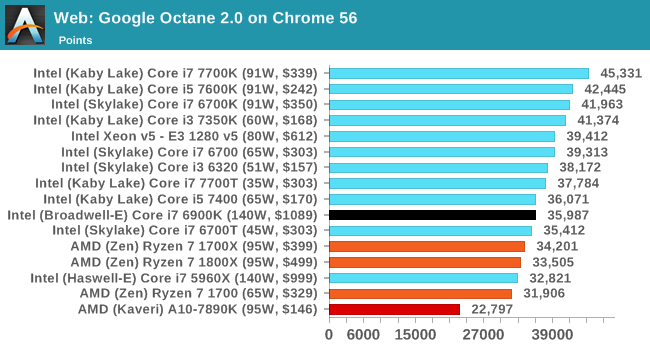
WebXPRT 2013 and 2015 [link]
While the previous three benchmarks do calculations in the background and represent a score, WebXPRT is designed to be a better interpretation of visual workloads that a professional user might have, such as browser based applications, graphing, image editing, sort/analysis, scientific analysis and financial tools. Web2013 is the older tool, superceded by Web2015, however both still are highly relevant for high-performance web applications today.
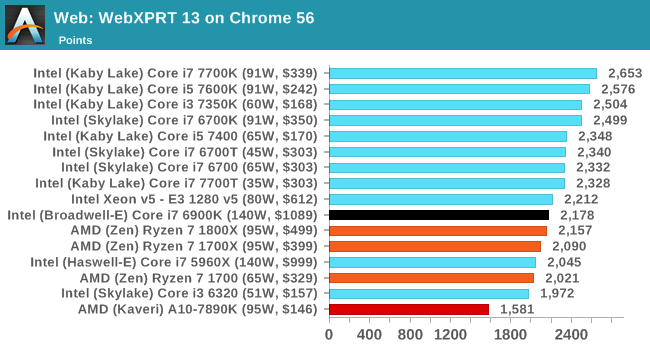
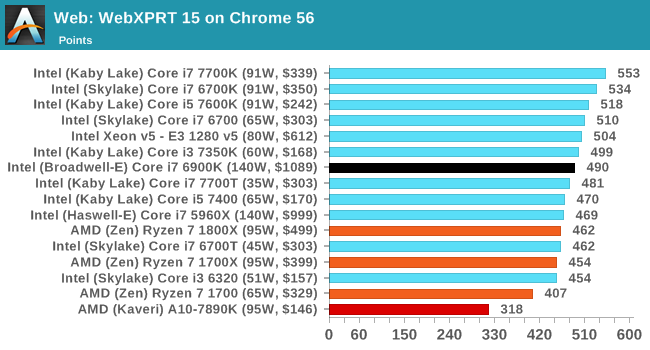


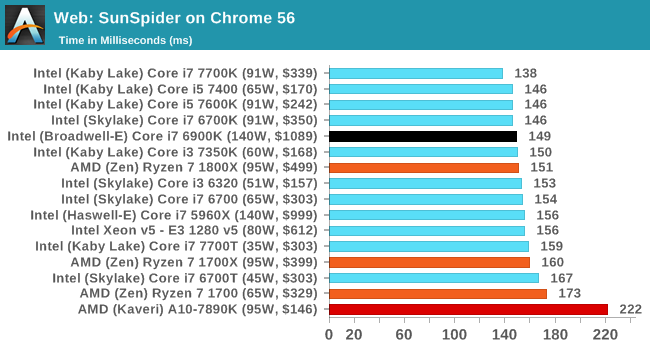
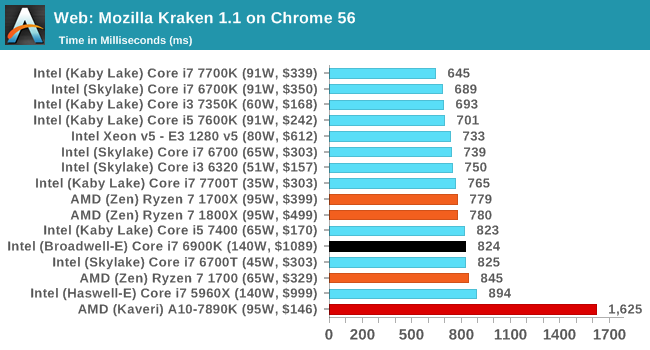








574 Comments
View All Comments
Meteor2 - Friday, March 3, 2017 - link
...In which case you'd be better off with a 7700K, looking at the benchmark results. Cheaper too.ddriver - Thursday, March 2, 2017 - link
Ryzen offers the same performance at half the cost. More pci-e lanes is good for io, however quad channel memory is pretty much pointless, aside of pointless synthetic benches. Ryzen might not make it to my personal workstation due to the low pci-e lane count, but it has enough to replace my aging 3770k farm nodes, to which it will be a significant upgrade, provided the chip and platform turn out to be stable and bug free,Intel has gotten lazy and sloppy, bricking products, chipset bugs, they haven't really done anything new architecture wise for years, milking the same old cow.
It is rather silly to assume that gaming dictates CPU prices, this IS NOT a gaming product, if your ass-logic is to be followed, the intel needs to drop the 7700k price to 168, because in games it is barely any faster than the i3-7350K, and has the same pathetic, even lower than ryzen, number of pci-e lanes.
This is a chip for HPC, which gaming is NOT. Go back to the kiddie garden, eight core chips are for grown ups ;)
imaheadcase - Thursday, March 2, 2017 - link
People compare it to gaming, because its the main driving for these type of CPUs, its not even gaming specfic but VR, Graphics modeling, etc. You honestly think people are buying these for offices or industry for complex math problems? lolddriver - Thursday, March 2, 2017 - link
It is not "people" but "fanboys", and they cling to gaming because it is the only workload where intel can offer better performance for the price, albeit by comparing products from different tiers, which is quite frankly moronic.Cars are faster than trucks, so who in the world needs to spend money on trucks? That's the kind of retarded logic you are advocating...
Smart people buy whatever suits their needs. Obviously, if all you do is play games you wouldn't be buying ryzen or a lga2011 system. Just get an unlocked i5 and overclock it, best bang for the buck. You must realize that even if you don't, other people use computers for tasks other than gaming. And for a large portion of them ryzen will be the best deal, because it is versatile - it is good enough for gaming too, while still offering significant performance advantage compare to an intel quad in tasks that are time staking, and are very much competitive with intel's 8 and 10 core chips while delivering more than twice the value, which is important for everyone who doesn't have money to throw away.
Claiming that "gaming is the main driving for these type of CPUs" is foolish to say the least, because games don't benefit from that particular type of CPUs. Most of the games can't even property utilize 4 threads. And this is not likely to change soon, because the overhead of complexity and thread synchronization is not worth it for non-performance demanding tasks such as games.
Lord-Bryan - Thursday, March 2, 2017 - link
That's one really well thought out argumentrarson - Thursday, March 2, 2017 - link
Ryzen's versatility and price are the two biggest factors that make it so good. It might not beat the very best gaming CPU that Intel has, or the very best multi-threaded monster that Intel has in every scenario, but it's competitive with both at half the price of the high-end stuff. Hence, while I do game some and want to build a computer to use for gaming, I also do other stuff like audio production that benefits greatly from Ryzen's multi-threaded performance. To me, it's a no-brainer: Ryzen right now is the best bang-for-the-buck chip for someone who wants all-around high-end performance, by far. Maybe not the 1800X, I kind of think the 1700X is a better value, but still, for most people who want multiple-use performance instead of absolute maximum gaming performance, Ryzen is the clear choice.Ryzen's max clock speeds seem, like Intel's, to be hindered by the total number of cores on chip, so it should be extremely interesting to see how the 4- and 6-core chips overclock once they arrive, and what kind of performance they'll achieve. I actually think that, like Intel, a 4-core Ryzen might be a better gaming chip than the 8-core, and if that's the case, then it might be really darn close to Intel's best Kaby Lake, because like you pointed out, most games aren't threaded well at all.
Additionally, from a gaming perspective, it seems like AMD has done more to push technology forward in that respect than anyone else. They've worked on Mantle, Vulkan, FreeSync, TrueAudio, and others. They've always tried to give performance value by offering more cores, but software has been slow to take advantage of them. Intel is content to stagnate by offering extremely incremental increases because performance is "good enough" so developers have no reason to really try to take advantage of extra cores aside from outside use cases. With Ryzen, AMD is pushing chips towards higher core counts (much like they did with the Athlon X2) but this time, they're trying harder to get developers on board and help them achieve good results. So while it always takes forever for software to better utilize the hardware, once the hardware becomes more common the software will start to follow and you'll see the actual gaming performance improve. Is that a valid reason to buy Ryzen today if your sole focus is gaming? Of course not, but it does bode well for Ryzen owners in the future. The performance can only get better. Can the same be said about Intel? Well, probably not if you're using one of the 4-core chips. It's pretty much a known quantity.
I had high hopes for Bulldozer and Ryzen is the exact opposite of what Bulldozer was. I feel like the CPU market has been stagnant for years and now suddenly there's a reason to be excited. This makes AMD competitive again, which will be good for pricing even if you're an Intel fan. It's been a long wait, but it was worth it, this is a good product.
Notmyusualid - Friday, March 3, 2017 - link
http://www.gamersnexus.net/hwreviews/2822-amd-ryze...Makaveli - Thursday, March 2, 2017 - link
+1 ddriver you destroyed that kid with your logic well done.khanikun - Friday, March 3, 2017 - link
Gaming definitely isn't the main driving force for CPUs, as use case changes. I bought a 7700K for my gaming rig. I'd get a 1700 for a VM host, as I'd like to start building a lab again. It won't be this round though. I'd rather wait for AMD to iron our any kinks and buy the next generation. It's something the 7700K could do, but more cores would definitely make it a much better lab.Meteor2 - Friday, March 3, 2017 - link
Nobody buys mid/high-end consumer chips for HPC. They buy them for gaming. A few for video production. That's it.